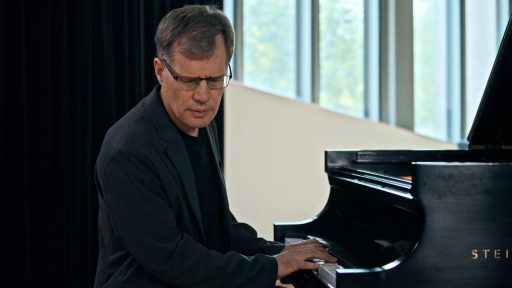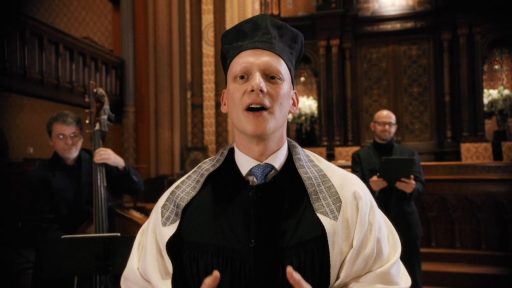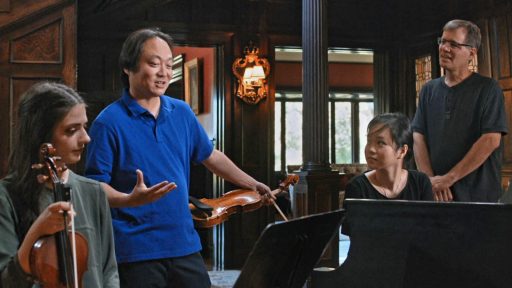Just like Aaron Copland did for much of his career, Now Hear This host Scott Yoo works with students as part of a teaching festival. Whether you are preparing to audition for a prestigious opportunity or just hoping to impress your friends and family, Scott’s tips may help.
Hear more of Scott Yoo’s advice to rising musicians during mock auditions in Now Hear This “Aaron Copland: Dean of American Music” premiering April 22 at 9/8c on PBS.
Five audition tips from Scott Yoo
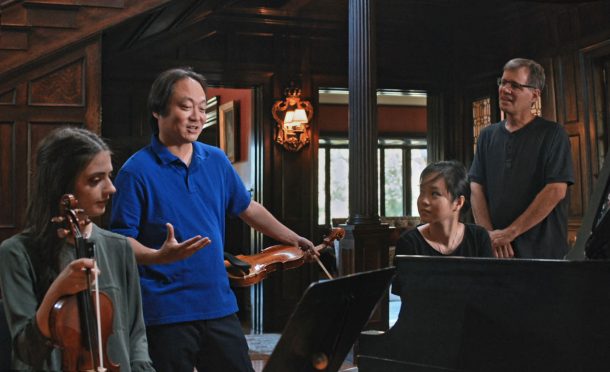
Scott Yoo and John Novacek with students. Photo Credit: Arcos Film & Music.
1) Don’t try to hit a six-run home run in an audition.
I once saw an interview with the great baseball manager Terry Francona. Faced with adversity, he urged his players not to try to hit a “six run home run.” Just try to have a good at-bat, swing only at the pitches you want.
We musicians can learn from this as well. Rather than try to play better than you ever have before, just play beautifully, the way you’ve practiced. Play the same and be yourself.
2) The art of auditioning is the same as the art of practicing.
Make sure your concentration and attention to detail is as high as possible when practicing, because what comes out at an audition, lesson or performance is usually a very accurate representation of what happened in the practice room.
People often think that they play worse in auditions than at home, but often it is a case of selective memory. We listen like hawks while we are in an audition, but don’t listen so carefully in the practice room. We let our mistakes slide at home, but they are like knives and daggers in an audition.
Young musicians I speak with are often shocked when I let them know that it cannot be taken as a given that one is improving while practicing. When I roam the halls of practice rooms at music schools, I would say that a majority of the practicers I hear are actively getting worse, by reinforcing bad habits, bad pitch, bad rhythm, shaky tempo, etc.
Practice at a high level and you will perform/audition at a high level as well. Gold in = gold out!
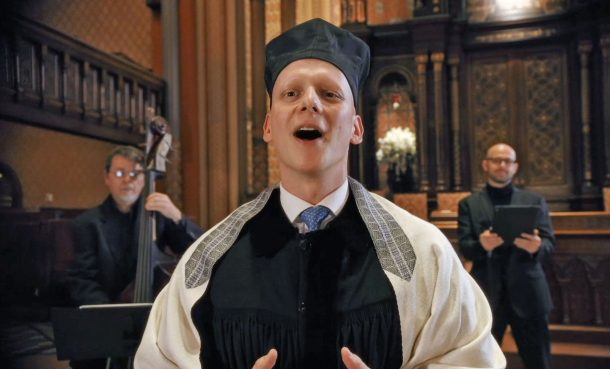
Cantor Daniel Mutlu. Still from Now Hear This “Aaron Copland: Dean of American Music.”
3) Make sure you are very strict about what tempo you practice.
One of my conducting teachers, Michael Gilbert, always, always stressed the importance of getting the right tempo. Too slow, and the music drags. Unnaturally fast and the music can be too quick to play.
If you’ve really worked hard on a given piece of music for an audition, your tempo will probably be very consistent each time. When you enter the audition room, don’t suddenly play 10% faster than you did in the practice room. Just repeat what you’ve been preparing. Again, play the same and be yourself.
3a) On the other hand, be very careful when using the metronome.
I often hear young musicians elongating one beat in a measure, then rushing in the next. They end up starting the next measure exactly on time, because two errors in opposite directions have cancelled each other out.
For me, that is a dead giveaway that they’ve been what I call “playing duets with a metronome.” It reminds me of a pair of glasses that has been mangled beyond recognition, then bent back into shape. Yes, the glasses rest on the nose and ears, but the lenses are all in the wrong place and the prescription feels funny. A metronome is a great tool but can easily turn into a malignant element in your preparation. Great rhythm comes from listening critically to oneself and being picky.
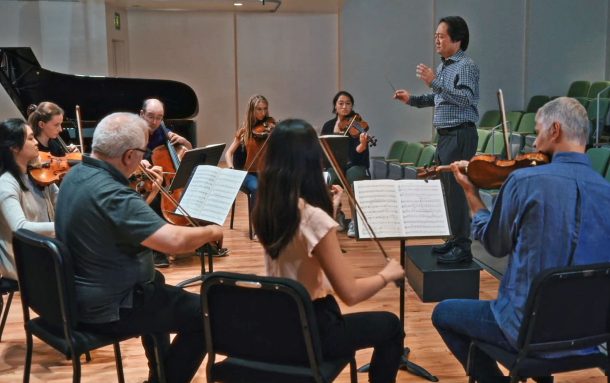
Scott Yoo conducting musicians. Still from Now Hear This “Aaron Copland: Dean of American Music.”
4) Know what everyone else is doing!
You’re playing a piece of music. What are the clarinets doing right now? How about the cellos? Get a score of the music you’re performing and play the cello part. The clarinet part. Listen to your own performance in their shoes. That cellist or clarinetist might be the one whose vote you need to win. You want to play in a way that is considerate of their musical needs.
5) Simulate the audition many times.
Give a friend or parent your audition list. They should call out the different pieces of music in a random order, so you don’t know what is coming next. Videotape the mock audition so you can hear what went well, and what did not. Enter the room that you will perform your mock audition, just to simulate that part of the experience. I would do this at least 20 times before taking an actual audition.

